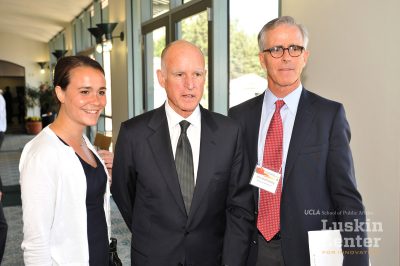RIP Jim Mahoney, Climate Champion At Bank Of America
Financial executive helped launch UC Berkeley/UCLA Law “Climate Change and Business Initiative”

Jim Mahoney was perhaps an unlikely climate hero. A senior Bank of America and FleetBoston Financial executive for 25 years who tragically passed away this past weekend at the age of 67 (the result of complications from injuries he sustained in a bicycle accident last year), Jim’s work focused on global corporate strategy and public policy for a major financial institution. Climate change would have been just one component of his portfolio of issues affecting banking.
But back in 2008, Jim teamed up with his former boss, then-California Attorney General Jerry Brown, to make a difference on climate policy. Brown and Mahoney, through Brown’s then-climate advisors Ken Alex (now with Berkeley Law) and Cliff Rechtschaffen (now a California public utilities commissioner), approached Rick Frank (now with UC Davis Law) and Steve Weissman (now with the Goldman School) at UC Berkeley Law and Sean Hecht and Cara Horowitz at UCLA Law to launch a Climate Change and Business Initiative at the law schools.
The initiative was only planned for one year, to focus on then-emerging topics in climate policy like infill housing, small-scale renewable energy, low-carbon agricultural practices, and residential energy efficiency financing. The idea was to convene small groups of experts for roundtable discussions that would inform policy reports on business solutions to reduce greenhouse gas emissions. These reports in turn would ideally educate California legislators and regulators on cutting-edge, consensus climate solutions.
But with Jim’s quiet but committed leadership at Bank of America, that one-year initiative soon grew to a multi-year program that has to this day covered multiple climate and clean energy issues and influenced legislation and regulation in California and throughout the country. Here are just a few highlights:
- Pioneering climate and clean energy legislation: The initiative helped inform the California’s first-in-the-nation energy storage mandate, which proved so successful that the initial targets have been increased and expanded. It also inspired legislation to streamline permitting for utility-scale solar PV on degraded agricultural land, as well as to increase California’s renewable energy requirements.
- Regulation and funding: Recent work on boosting energy retrofits for low-income multifamily buildings was incorporated into state energy planning, while a biofuels convening helped steer millions of dollars of state energy funding for this low-carbon industry.
- Inspiring out-of-state action: A number of the in-state policy recommendations have informed similar work elsewhere, such as our stakeholder process to identify prime areas for renewable energy development. And in general, California legislation on climate and energy has inspired similar action across the United States, particularly on renewable energy and zero-emission vehicles.
- Cataloguing climate solutions: All of the initiative’s recommendations over the years are compiled in the easy-to-use website climatepolicysolutions.org.
- Influencing public debate: In addition to convenings and reports, the initiative has led to publication of numerous op-eds (most recently on ways to make the electricity grid more resilient and low-carbon), webinars (such as on priority climate solutions with California’s top climate leaders), and conferences (including recently on expanding zero-emission freight technologies at Southern California’s ports).
- Training future climate leaders: Throughout the research involved with this initiative, the law schools have included numerous law students and recent graduates to help conduct that work. Many of them have gone on to further this work through their professional employment at law firms, clean technology companies and government agencies, among others, with one recent fellow now advising the Biden campaign on climate policies.
And on a personal note, Jim’s initiative provided me with an opportunity to dedicate my career to working on all of these important issues, as I was first hired at Berkeley Law for that one-year initiative before eventually directing the climate program at the law school’s Center for Law, Energy and the Environment (CLEE).
While many individuals have been involved in the Climate Change and Business Initiative over the years, none of this work would have been possible without Jim’s leadership at Bank of America. Along with his colleagues, including Rich Brown, Brian Putler, Kaj Jensen, Alexandra Liftman, and others, Jim ensured that the initiative had strong institutional support and funding to carry out this work, without ever interfering or trying to influence the content of what the initiative covered or recommended. Quite the opposite, he helped the law schools’ harness the Bank’s expertise and contacts to further the dialogues and reach of the findings.
Jim’s death is a blow to his family, friends, colleagues, and those of us who care about the issues he helped advance. The Boston Globe published a worthy tribute to his career and extensive family, including his volunteer stint driving then-presidential candidate Jerry Brown around New Hampshire and Wisconsin. Jim will be missed, but his legacy of climate leadership will live on in the work and policies he helped advance, and in the lives he touched. May he rest in peace.





Reader Comments